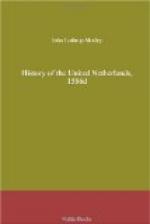[Strangely enough, Elizabeth was under the impression that the extra grant of 400,000 florins (L40,000) for four months was four hundred thousand pounds sterling. “The rest that was granted by the States, as extraordinary to levy an army, which was 400,000 florins, not pounds, as I hear your Majesty taketh it. It is forty thousand pounds, and to be paid In March, April, May, and June last,” &c. Leicester to the Queen, l1 Oct. 1586. (S. P. Office Ms.)]
The military operations were crippled for want of funds, but more fatal than everything else were the secret negotiations for peace. Subordinate individuals, like Grafigni and De Loo, went up and down, bringing presents out of England for Alexander Farnese, and bragging that Parma and themselves could have peace whenever they liked to make it, and affirming that Leicester’s opinions were of no account whatever. Elizabeth’s coldness to the Earl and to the Netherlands was affirmed to be the Prince of Parma’s sheet-anchor; while meantime a house was ostentatiously prepared in Brussels by their direction for the reception of an English ambassador, who was every moment expected to arrive. Under such circumstances it was in, vain for the governor-general to protest that the accounts of secret negotiations were false, and quite natural that the States should lose their confidence in the Queen. An unfriendly and suspicious attitude towards her representative was a necessary result, and the demonstrations against the common enemy became still more languid. But for these underhand dealings, Grave, Venlo, and Neusz, might have been saved, and the current ’of the Meuse and Rhine have remained in the hands of the patriots.
The Earl was industrious, generous, and desirous of playing well his part. His personal courage was undoubted, and, in the opinion of his admirers—themselves, some of them, men of large military experience—his ability as a commander was of a high order. The valour displayed by the English nobles and gentlemen who accompanied him was magnificent, worthy the descendants of the victors at Crecy, Poitiers, and Agincourt; and the good behaviour of their followers—with a few rare exceptions—had been equally signal. But now the army was dwindling to a ghastly array of scarecrows, and the recruits, as they came from England, were appalled by the spectacle presented by their predecessors. “Our old ragged rogues here have so discouraged our new men,” said Leicester; “as I protest to you they look like dead men.” Out of eleven hundred freshly-arrived Englishmen, five hundred ran away in two days. Some were caught and hanged, and all seemed to prefer hanging to remaining in the service, while the Earl declared that he would be hanged as well rather than again undertake such a charge without being assured payment for his troops beforehand!
The valour of Sidney and Essex, Willoughby and Pelham, Roger Williams and Martin Schenk, was set at nought by such untoward circumstances. Had not Philip also left his army to starve and Alexander Farnese to work miracles, it would have fared still worse with Holland and England, and with the cause of civil and religious liberty in the year 1586.




